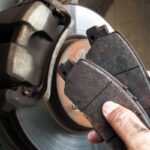In today’s fast-paced world, owning a car is practically a necessity. But, as any car owner will tell you, it’s not just about driving. Regular automotive service is the key to ensuring your vehicle runs smoothly and efficiently. So, what exactly is automotive service? Simply put, it’s the maintenance and repair work required to keep a car in optimal condition. Whether it’s a routine oil change, brake inspection, or more complex engine repairs, keeping up with automotive service can save you time, money, and the stress of unexpected breakdowns.
What is Automotive Service?
Automotive service refers to the process of maintaining and repairing vehicles to ensure their safe and efficient operation. It covers a wide range of tasks, from simple tune-ups to complex repairs. The ultimate goal? To extend the lifespan of your car and keep it running in peak condition.
The Importance of Regular Automotive Service
You might be wondering, why is it so important to service your car regularly? Well, just like our bodies need check-ups, cars need them too! Here are some compelling reasons:
- Prevent Breakdowns: Routine maintenance helps detect potential issues before they become major problems.
- Safety First: Regular service ensures that critical components like brakes, tires, and suspension are functioning properly.
- Fuel Efficiency: A well-maintained car uses fuel more efficiently, saving you money at the pump.
- Resale Value: If you plan to sell your car in the future, a well-maintained vehicle will fetch a higher price.
Key Automotive Services You Shouldn’t Miss
There are several crucial automotive services that every car owner should be aware of. Let’s dive into the essential ones:
1. Oil Change
An oil change is one of the most basic and vital automotive services. Engine oil lubricates the moving parts of the engine, reducing friction and preventing overheating. Over time, oil breaks down and loses its effectiveness, which can lead to engine damage. Most experts recommend changing the oil every 3,000 to 5,000 miles, depending on your vehicle and driving habits.
2. Brake Service
Your car’s brakes are arguably its most important safety feature. Regular brake inspections and maintenance can prevent dangerous situations on the road. This service includes checking the brake pads, rotors, and fluid. If you hear squeaking or grinding when braking, it’s time to get them checked!
3. Tire Rotation and Alignment
Tires wear down unevenly over time, especially the front ones. Regular tire rotation ensures even wear, extending the life of your tires. Wheel alignment, on the other hand, ensures your car drives straight and true, improving handling and fuel efficiency.
4. Battery Check and Replacement
A dead battery is one of the most inconvenient problems a driver can face. Regular battery checks can detect issues early. If your battery is more than three years old, it’s wise to consider a replacement to avoid getting stranded.
5. Transmission Service
The transmission is one of the most complex systems in your car. Regular transmission service, which includes fluid changes and filter replacement, can prevent costly repairs down the line.
Signs Your Car Needs Service
It’s not always easy to tell when your car needs attention. However, there are some clear indicators that your vehicle is begging for service:
- Strange Noises: Unusual sounds, like grinding, squeaking, or rattling, often indicate a problem.
- Warning Lights: If the check engine light or other warning lights appear on your dashboard, don’t ignore them.
- Poor Performance: If your car is slow to start, hesitates during acceleration, or doesn’t handle smoothly, it’s time for a check-up.
- Leaking Fluids: Puddles of oil, coolant, or other fluids under your car are a red flag.
- Vibration or Pulling: If your vehicle vibrates or pulls to one side, you could have an issue with your tires or alignment.
The Cost of Skipping Automotive Service
Skipping regular automotive service may save you a few bucks in the short term, but it can lead to costly repairs in the long run. For example:
- Ignoring an oil change could lead to engine failure, which could cost thousands of dollars to repair.
- Failing to replace worn brake pads can damage the rotors, leading to a more expensive repair.
- Overlooking tire rotations can cause uneven wear, meaning you’ll need to replace tires sooner than expected.
How Often Should You Service Your Car?
Now, this varies depending on your car’s make, model, and how often you drive. However, here’s a general guide:
- Oil change: Every 3,000 to 5,000 miles.
- Brake inspection: Every 10,000 miles or once a year.
- Tire rotation: Every 5,000 to 8,000 miles.
- Battery check: Every 6 months.
- Transmission service: Every 30,000 to 60,000 miles.
Check your vehicle’s owner manual for specific recommendations, and follow the service intervals closely.
FAQs about Automotive Service
Q1: How do I know if my car needs an oil change?
A: The most common sign is the oil change warning light on your dashboard. Additionally, if the oil appears dark and gritty on the dipstick, it’s time for a change.
Q2: What should I do if my car is overheating?
A: Pull over immediately, turn off the engine, and let it cool down. Never open the radiator cap while the engine is hot. Once cooled, check the coolant level. If it’s low, you may need to refill or have a professional inspect for leaks.
Q3: How often should I replace my air filter?
A: It’s recommended to replace the air filter every 12,000 to 15,000 miles, but this can vary based on driving conditions.
Q4: Why does my steering wheel shake when I drive?
A: A shaking steering wheel often indicates an issue with tire alignment, balancing, or even worn suspension parts.
Q5: Is it necessary to service my car at the dealership?
A: No, you can have your car serviced at any reputable automotive repair shop. Just ensure they use quality parts and follow the manufacturer’s service guidelines.
Final Thoughts on Automotive Service
Routine automotive service is the best way to keep your vehicle running smoothly for years to come. By staying on top of maintenance, you can avoid costly repairs, improve fuel efficiency, and ensure your car is safe to drive. It may seem like a hassle, but the long-term benefits far outweigh the inconvenience of a service appointment.
So, don’t wait for a problem to arise—stay proactive with your automotive service, and your car will thank you by running reliably for the long haul.
Authoritative Links:
- www.cars.com/auto-service
- www.edmunds.com/car-maintenance-guide
- www.kbb.com/maintenance







